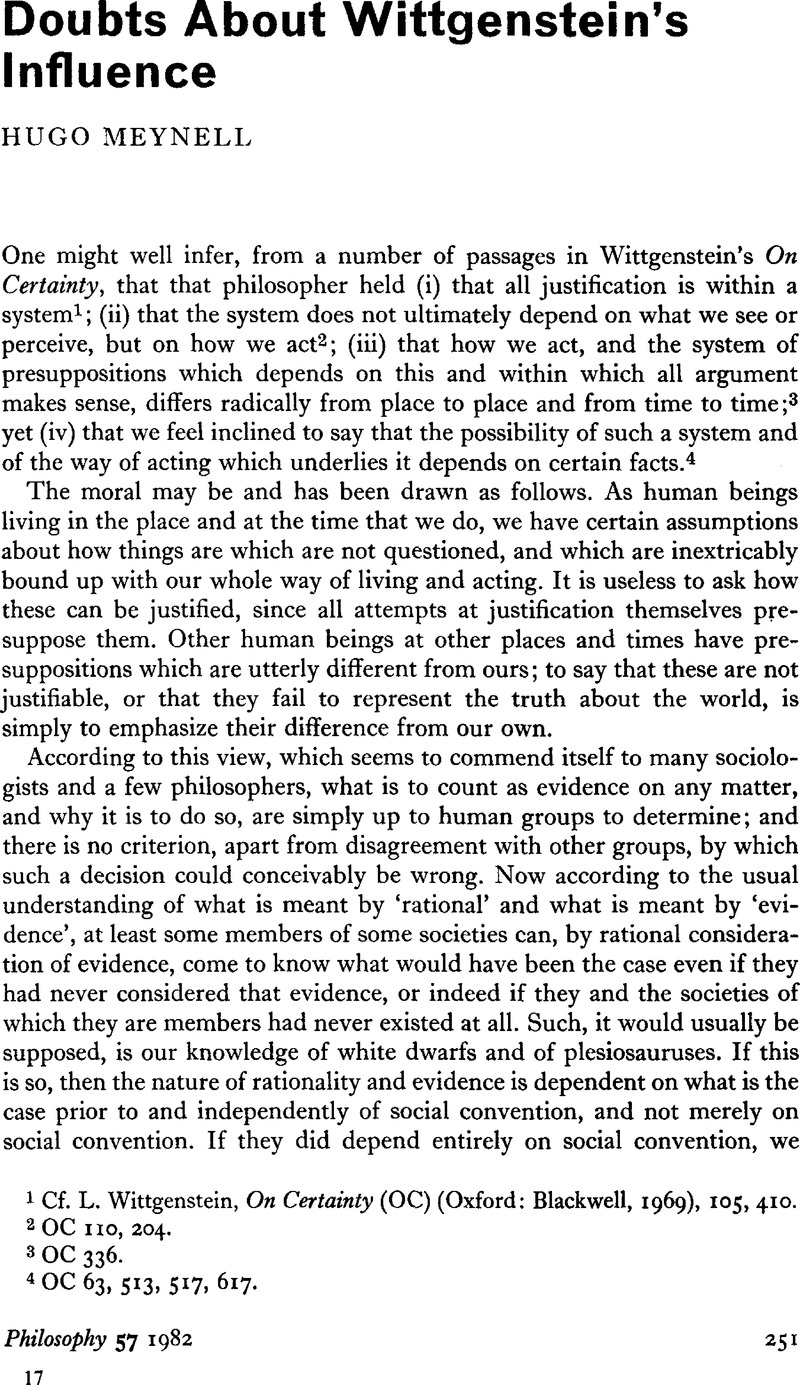No CrossRef data available.
Article contents
Doubts about Wittgenstein's Influence
Published online by Cambridge University Press: 30 January 2009
Abstract

- Type
- Discussion
- Information
- Copyright
- Copyright © The Royal Institute of Philosophy 1980
References
1 Cf. Wittgenstein, L., On Certainty (OC) (Oxford: Blackwell, 1969), 105, 410.Google Scholar
2 OC 110, 204.
3 OC 336.
4 OC 63,513, 517, 617.
5 Phillips, Derek L., Wittgenstein and Scientific Knowledge: A Sociological Perspective (London: Macmillan, 1977), 80.CrossRefGoogle Scholar
6 Ibid., 200-201.
7 Loc. cit. ‘If there are indeed a variety of language-games, with different standards for truth and knowledge, does this not call into question all conceptions of truth and knowledge?’ (201).
8 Ibid., 201-202.
9 Bloor, D., ‘Wittgenstein and Mannheim on the Sociology of Mathematics’, Studies in the History and Philosophy of Science ( 1973), 173.Google Scholar
10 Ibid., 176.
11 Ibid., 184.
12 Wittgenstein, , Remarks on the Foundations of Mathematics (Oxford: Blackwell, 1956), I, 2Google Scholar; Bloor, op. cit., 184.
13 Ibid., 185.
14 Bloor, D., ‘Popper's Mystification of Objective Knowledge’, Science Studies (1974)Google Scholar, especially 75-76: ‘To appraise an argument for validity is to apply the standards of a social group. It cannot be other, or more, than this because we have no access to other standards … The objectivity of knowledge resides in its being the set of accepted beliefs of a social group … The authority of truth is the authority of society.’
15 Bloor, ‘Wittgenstein and Mannheim’, 177.
16 For example, Germain Grisez and Bernard Lonergan.
17 E.g. OC 83, 204.
18 Cf. OC 110, 204.
19 Grisez, G., Beyond the New Theism (Notre Dame, Indiana: University of Notre Dame Press, 1975).Google Scholar
20 Cf. B. Lonergan, Method in Theology (London: Darton, Longman and Todd, 1971), Ch. 1.
21 R. M. White, ‘Can whether one proposition makes sense depend on the truth of another?’, in Understanding Wittgenstein, G. N. A. Vesey (ed.) (London: Macmillan, 1974), 25.
22 Wittgenstein, Notebooks 1914–1619 (Oxford: Blackwell, 1961), 53.
23 A. Kenny, ‘The Ghost in the Tractatus’, in Vesey, op. cit., 12; citing Philosophische Grammatik (Oxford: Blackwell, 1969), 129; The Blue and Brown Books (Oxford: Blackwell, 1978), 54; Philosophical Investigations, I (Oxford: Blackwell, 1953), 251.
24 Philosophische Grammatik, 186; Kenny, op. cit., 12.
25 OC 454; cited by Kenny, Wittgenstein (Harmondsworth: Penguin Books, 1973). 205.
26 OC 114, 306, 369, 456, 486, 507; cf. Kenny, op. cit., 206.
27 OC 125.
28 OC 163, 337.
29 OC 341; cf. Kenny, op. cit., 207.
30 OC 94. Cf. Kenny, op. cit., 216-217. It is of crucial importance that, as Wittgenstein says, doubt and truth have a specifiable relation to grounds; what would count, he asks, as grounds for a grown man believing he lived in America when in fact he lived in Britain? (OC 71, 75; cf. Kenny, op. cit., 218).
31 Cf. K. Marx and F. Engels, On Religion (Moscow: Foreign Language Publishing House, 1957), 25.
32 R. M. White, op. cit., 28.
33 In preparing this paper, I have been greatly helped by discussions with Christopher Coope, Peter Geach, Ullin Place, George Ross and Roger White.


